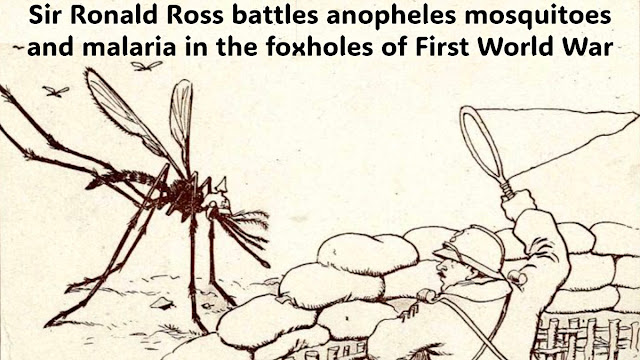NO SUCH THING AS LITTLE (PART I)
By Akin Ojumu
Sir Ronald Ross was a small statured English man whose impact reverberates from the pages of the history books. His name probably would not ring any bells with many people, especially those living in the mosquito infested and malaria-endemic tropical and sub-tropical regions of the world.
However, many of these people would not have been born or born alive, were it not for the immense dedication to science and deep compassion for the suffering of this eccentric British Scientist.
The relentless drive and resolve of this one little man saved untold numbers of lives in Africa, Asia and elsewhere from being killed by serious and sometimes fatal disease caused by a parasite.
On August 20, 1897, the world witnessed a profound and consequential scientific discovery that would go on to alter the trajectory of the health and well-being of billions of people around the globe.
It was on that fateful day, one hundred and twenty-one years ago, that Ronald Ross, a combative and confrontational British officer in the Indian Medical Services, demonstrated the critical role mosquitoes play in the transmission of malaria parasites to human beings.
Inside the crummy little shack of a laboratory, the temperature was inhumanely hot, heated up to near boiling point by the record high humid summer monsoon weather of Secunderabad, India.
Bent over an aged microscope, the sweat from his brow, like thick drops, forming a puddle around his feet, Ronald Ross had to stifle a desire to yell “Eureka!” as he observed the swarming horde of parasites in the gut of the female anopheles mosquito he had just dissected.
Finally, he has now received the definitive confirmation he had long prayed and hoped ever since the day he committed himself to this line of work. It was the crowning achievement of a professional career spent trying to figure out the cause of the deadly plague that hitherto decimated communities.
Sir Ronald Ross’ discovery solved one of the greatest medical mysteries of the time; the role mosquitoes play in the transmission of malaria parasites to human beings.
As you can imagine, Ronald Ross was ecstatic at this discovery. The following day, consumed with joy and exuberance, Ronald Ross put pen to paper and composed the following poem, which he sent to his wife;
“This day relenting God hath placed within my hand a wondrous thing; and God Be praised. At His command, seeking His secret deeds with tears and toiling breath, I find thy cunning seeds, O million-murdering death. I know this little thing a myriad men will save. O death, where is thy sting? Thy victory, O Grave?”
In commemoration of the landmark discovery, August 20 is designated the World Mosquito Day. You heard that right. A whole day is specially dedicated to mosquitoes – an itty-bitty blood sucking villain. The annoying nuisance of an insect has found its place on the Mt Rushmore of the animal kingdom. When you think about it, it’s implausible that such a skinny scallywag would find a seat among nobles and dignitaries of the world in whose honor days of the year have been named.
The little rascal barely measures a quarter of an inch (approximately 6 millimeter) in length. When it hovers around you, salivating for your blood, it’s so small you can barely see it. All you hear is the infuriating buzzing sound it makes. Yet, this tiny beast accounts for close to 1 million deaths per year. That something this small could wreck so much havoc should come as a surprise only to those who don’t understand that the size of a thing does not always equal its might.
For his groundbreaking work on the transmission of malaria by which he showed how it enters the organism and thereby laying the foundation for successful research on this disease and methods of combating it, Sir Ronald Ross was awarded the Nobel Prize for Medicine in 1902 becoming the first British Nobel laureate, and the first born outside Europe.



Comments
Post a Comment